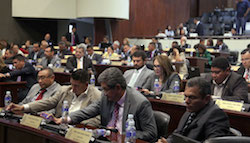Honduras has strengthened legislation to combat gang activity by enacting stricter prison sentencing guidelines and new legal tools for prosecuting gang members — all in the hopes of reining in street gangs and the crime and violence they generate.
On July 22, Honduras’ Congress approved reforms to Article 332 of the country’s Penal Code — known as the “anti-gang law” — that increase potential prison terms for gang members to between 20 and 30 years, reported the AFP.
Those deemed by judges and prosecutors to be a gang leader also now face up to 50 years behind bars. The previous law sentenced gang leaders to between three and six years in prison, and included an approximate $4,750 fine.
The reforms — intended to make the fight against illicit criminal organizations more effective — also increase prison sentences by up to one-third for gang members who have conspired to attack state officials, as well as those who have used minors, the elderly, or pregnant women to commit crimes.
Convicted gang members who collaborate with the investigations of authorities, however, can now also receive a reduction of up to two-thirds of their prison term. Gang leaders are not eligible for reductions.
InSight Crime Analysis
A key issue regarding the implementation of Honduras’ penal code reforms is the question of definitions. It remains unclear what exactly constitutes a “gang” under Honduran legislation, and how officials will determine if someone is a gang member or leader when it comes to passing down prison terms.
Indeed, some community members who facilitate gang activity — either through coercion or personal motivations — by collecting extortion payments or selling drugs, have not been formally initiated into the gang and should not be considered full-fledged members.
SEE ALSO: Coverage of Security Policy
Nonetheless, to a certain extent, the reforms account for this dilemma by increasing prison time for gang members who exploit vulnerable segments of the population to commit crimes. This is especially important in the case of minors — who are frequently recruited by gangs since they cannot be prosecuted as adults. In effect, Honduras’ reforms work to shift the burden of risk away from minors and onto the gang members who recruit them. This may serve as a more effective deterrent to the participation of minors in criminal groups than legislation seen elsewhere in the region — namely Brazil, where Congress recently lowered the age of criminal responsibility from 18 to 16.
New laws giving Honduran lawyers more tools to prosecute gang members and gang activity can be seen as a positive step. However — as with neighboring El Salvador’s new security strategy — the true challenge will come during implementation. Unfortunately, Honduras’ weak and corrupt criminal justice system raises doubts as to the positive effects these reforms will have at reducing high levels of insecurity and violence.

